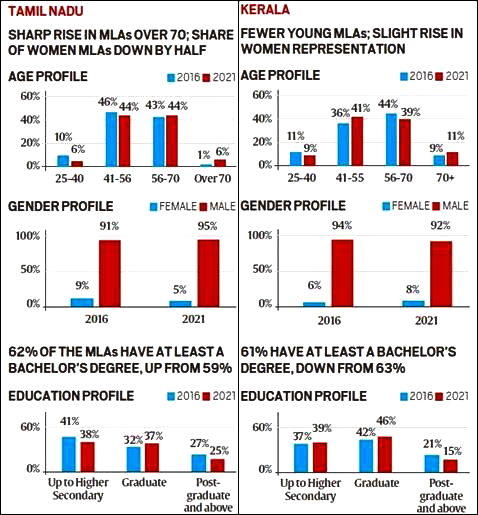Social Justice
Participation of Women & Youth in State Assemblies
- 04 May 2021
- 7 min read
Why in News
Recent data from the three new state assemblies, which are West Bengal, Kerala and Tamil Nadu, show less numbers of women and youth Member of Legislative Assemblies (MLAs).
- The data of the 2019 lok sabha elections also show that the participation of women is low. According to a list compiled by the Inter-Parliamentary Union in 2019, India ranks 153 out of 190 nations in the percentage of women in the lower house of world parliaments.
- India is young. Its leaders are not. The country’s median age is 29. The average parliamentarian is 55.
Key Points
- Reasons for Less Number of Women MLAs:
- Illiteracy - It is one of the main hurdles in making women politically empowered.
- Work and Family - Uneven distribution of household work between men and women is also one of the important factors in this regard.
- Lack of Political Networks - The lack of openness in political decision-making and undemocratic internal processes pose a challenge for all newcomers, but particularly for women as they tend to lack insider knowledge or political networks.
- Lack of Resources - Because of their low proportion in the inner political party structure of India, women fail to gather resources and support for nurturing their political constituencies.
- Lack of Financial Support - Women do not get adequate financial support from the political parties to contest the elections.
- Societal and Cultural Norms - These norms imposed on women bar them from entering politics.
- Unfriendly Environment - Overall political parties’ environment too is not women-friendly, they have to struggle hard and face multi-dimensional issues to create space for them in the party.
- Reasons for Less Number of Youth MLAs:
- False Believe - Political parties believe that the youth, having not seen enough of life, are unprepared for the demands of top-flight politics.
- Youth will not be taken seriously - Political parties fear that Indian electors who respect older politicians will not take young candidates seriously.
- Veterans not leaving - Key party decision makers, typically veterans, do not want to yield space.
- Muscle power politics - Politicians use muscle and money power to prevent entry of good people to enter politics.
- Less chance of success - The chances of failure are high and very few people become successful.
- Good people avoid politics - General perception of a common man about a politician is someone who is deceptive and corrupt. So people from well to do fields tend to avoid themselves being listed in categories of politicians.
- Unethical practices - Many fail to enter due to dirty politics and due to fear of harm to good image. Unethical practices have become the norm in politics.
- Nepotism - It plays a major role and many youth who become successful politicians belong to influential political families.
- Other reasons - Rising campaign spending and rotational reservation in municipal, panchayat and mayoral elections have created barriers to upward movement for aspiring young politicians.
- Related Initiatives:
- The Women's Reservation Bill 2008:
- It proposes to amend the Constitution of India to reserve 1/3rd of all seats in the Lower house of Parliament of India, the Lok Sabha, and in all state legislative assemblies for women.
- Reservation for Women in Panchayati Raj Institutions:
- Clause (3) of Article 243D of the Constitution ensures participation of women in Panchayati Raj Institutions by mandating not less than one- third reservation for women out of total number of seats to be filled by direct election and number of offices of chairpersons of Panchayats.
- National Youth Parliament Festival:
- It is organised by National Service Scheme (NSS) and Nehru Yuva Kendra Sangathan (NYKS) under the aegis of Ministry of Youth Affairs and Sports to:
- Hear the voice of youth in this age bracket of 18-25 who are allowed to vote but cannot contest in elections.
- Encourage the youth to engage with public issues, understand the common man’s point of view, form their opinion and express these in an articulate manner.
- It is organised by National Service Scheme (NSS) and Nehru Yuva Kendra Sangathan (NYKS) under the aegis of Ministry of Youth Affairs and Sports to:
- National Youth Parliament Scheme:
- The Ministry of Parliamentary Affairs has been implementing the Youth Parliament programme since 1966.
- To strengthen the roots of democracy, inculcate healthy habits of discipline, tolerance of the view of others and to enable the student community to know about practices and procedures of the Parliament.
- The Women's Reservation Bill 2008:
Way Forward
- It is the need of the hour in a country like India to have equal participation of all the sections of society in mainstream political activity therefore necessary steps should be taken to promote it.
- Considering legally-backed youth and women quotas which could be in the form of either seats exclusively (and rotationally) reserved for youth and women or a specified proportion of young candidates all registered parties contesting an election must field.
- Municipal and panchayat polls should give rise to leaders who have experience at the ground level. Such leaders, after some experience, should be able to run for state and eventually the central legislative seats.
- Promoting Inner party democracy, where in a democratic political party the various positions like president, vice-president, secretary, treasurer etc are filled by the election process.





